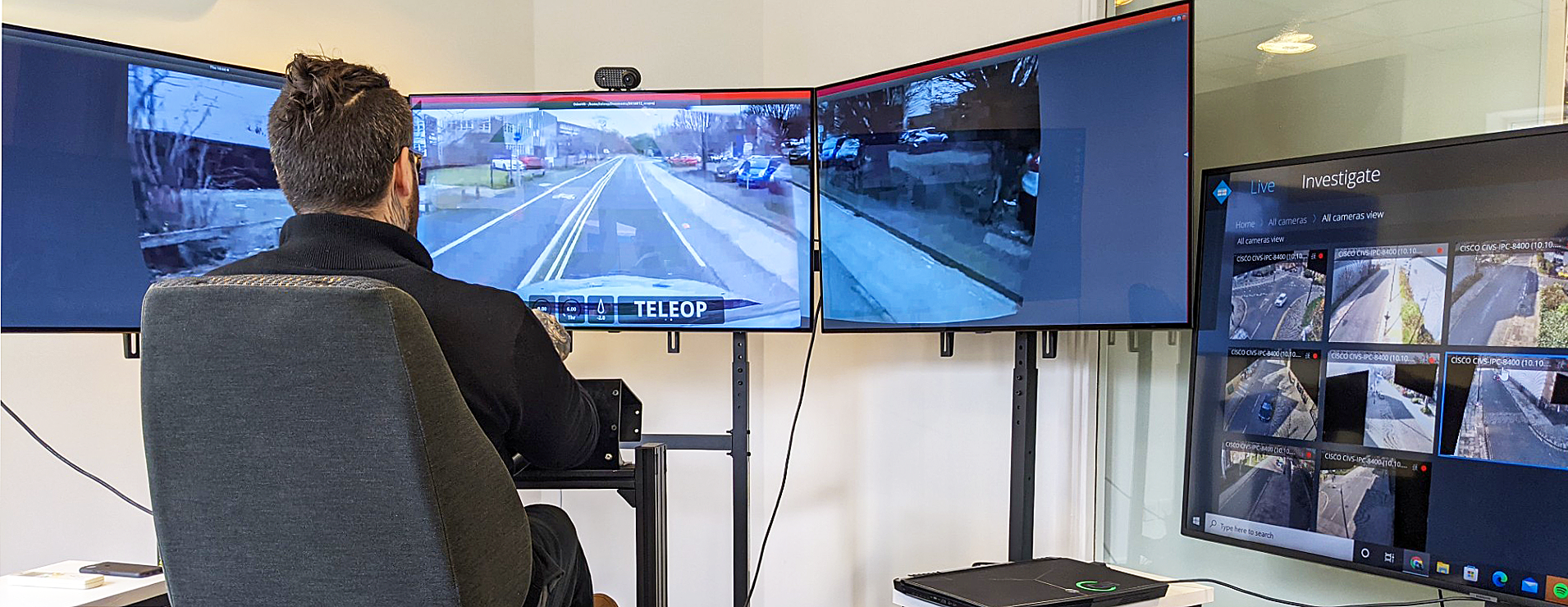
- Categories:
- News
- /
- Announcement
- /
- Press Releases
New Feasibility Study Launches to Shape the Future of Autonomous Vehicle Oversight
Loughborough, UK, 24 July 2025 – Funded by UK Government, Project NAVIGATES has commenced with an aim to explore centralised control centres to unlock safe and scalable deployment of autonomous vehicles in the UK. Project NAVIGATES is part of CCAV’s CAM Pathfinder Programme.
Project NAVIGATES (Networked Autonomous Vehicle Integration and Governance with Advanced Technology and Security) will assess the technical and commercial case for Regional Remote Service Operator Control Centres (RSOCCs), a critical enabler for the safe and cost-effective rollout of Connected and Autonomous Vehicles (CAVs) in applications such as public transport, logistics and emergency response. The project will be led by Belfast-based cybersecurity specialists Angoka, in partnership with low-emission transport experts Cenex.
The CAM Pathfinder Programme, as part of the UK’s modern Industrial Strategy and the Advanced Manufacturing Sector Plan, is delivered by the Centre for Connected and Autonomous Vehicles, a joint unit between the Department for Business and Trade (DBT) and the Department for Transport (DfT) in partnership with Innovate UK and Zenzic.
Similar to air traffic control centres, a regional RSOCC would oversee fleets of driverless vehicles operating with No User in charge (NUiC). This centre would monitor multiple vehicles in real-time, intervene when necessary and help the public sector coordinate services across different regions and use cases. Project NAVIGATES is the first dedicated study in the UK to explore this model in detail.
In the following months, the project will:
- Research, identify, document and validate the technical and user requirements for an RSOCC.
- Conduct a detailed safety and threat assessment for related data transmission needed for monitoring and control.
- Develop a high-level system design for control centres, detailing security and communications frameworks.
- Undertake an outline business case for operations.
- Identify partners and locations for a follow-up demonstration project.
Cenex will lead on stakeholder engagement and business case modelling, drawing on experience from previous projects such as the IUK Project RUBICON. Angoka will focus on technical analysis and security design, utilising their expertise in secure communications and remote operations in both CAV and drone environments. By engaging with potential end-users and the broader stakeholder community, Cenex will identify the requirements for the successful deployment of these centres. By combining our expertise in low-carbon transport with advanced operational technologies, Cenex is contributing to the development of a smarter, cleaner future for mobility
Robert Evans, CEO of Cenex, stated:
“We are pleased to partner with Angoka on this significant CCAV-funded feasibility study. The NAVIGATES project highlights the vital role that remote operational centres play in the safe and efficient deployment of autonomous vehicles. These centres are not only responsible for overseeing self-driving vehicle services but can also serve as the nerve centres of a new transport ecosystem, ensuring resilience, responsiveness, and public trust. We look forward to hosting a workshop for project NAVIGATES at Cenex Expo 2025.”
Steve Berry, Chairman at ANGOKA said:
“This is a truly significant project helping advance the roll out of autonomous vehicles. With this study we will have the most up to date review of current and forthcoming legislation and how this would affect the widespread adoption of CAVs. We look forward to working on this project with Cenex to establish the most complete picture of what the perceived threats and requirements are to assure the cyber security when operating autonomous ‘driver on the loop’ systems.”
Mark Cracknell, Programme Director at Zenzic, said:
“We are thrilled to announce the NAVIGATES project, spearheaded by ANGOKA and Cenex, as one of the fourteen exciting CAM Pathfinder Feasibility Studies taking place across the UK. The deployment of Connected and Automated Mobility solutions holds incredible promise – enhancing accessibility, reducing emissions, and fostering a transport network that is both reliable and inclusive. The NAVIGATES project seeks to address specific challenges that will be key to unlocking those benefits. We are looking forward to working with the project consortia as they further develop their business case and provide vital insight into the opportunities presented by the deployment of CAM solutions in regions throughout the UK.”